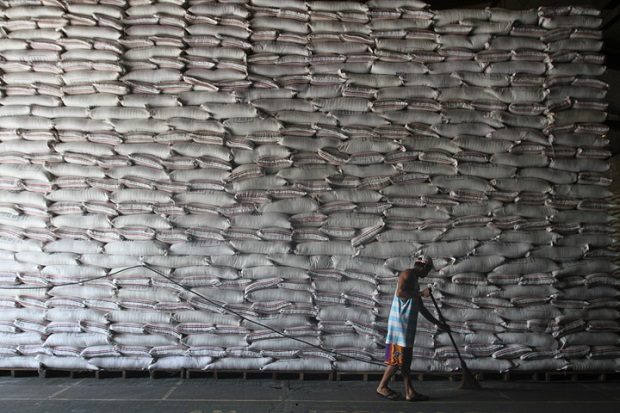Food security in the time of COVID-19

Joan Bondoc/Inquirer
The Covid 19 pandemic is fast turning into a food security crisis.
Food security is generally defined by United Nations agencies as the ability of a country to give its population access, at all times, to ample, safe, nutritious and affordable food.
The problem is that neo-liberal economic planners, obsessed in linking Philippine agriculture to the world market, have translated the definition into a simple one: procuring essential food, wherever this is grown and developed, based on global market conditions and letting weak domestic producers turn to alternative crops or fall on the wayside if they cannot compete globally.
This, in brief, is the raison d’etre for the controversial Rice Tariffication Act of 2019. The law dismantled the pivotal role of the National Food Authority (NFA) in the importation of rice and balancing of palay prices at home and gave big private corporations a free hand in controlling rice importation and distribution.
Under the law, the Philippines became once more the world’s biggest rice importer. The law also impoverished palay farmers nationwide as palay prices fell below the usual cost of production.
Now with Covid-19, the Philippines is facing a serious dilemma: how to maintain the narrow neo-liberal framework of food security in the case of rice.
Signs of trouble
There are troubles in the traditional sources of the country’s rice imports – Thailand and Vietnam. Thailand is facing a drought and, moreover, has been concentrating more and more on high-value specialty rice varieties like Jasmine.
Vietnam, on the other hand, has already announced that it is suspending this year rice exports in order to meet the requirements of its own people. A third possible source for the Philippines is the United States, whose agricultural products are now heavily committed to China. India, another rice exporter, can easily become a rice importer, too, should it be affected by drought like Thailand.
The foregoing validate an earlier argument by those who questioned the super-liberal tarrification law: the global rice market is thin, and any major shortfall in rice production from any of the major sources of rice imports is likely to hurt the Philippines. Meantime, there is so much uncertainty on the supply of rice at home, especially with Covid-19 galloping across the archipelago.
The Department of Agriculture (DA) has been issuing press releases that there is enough rice harvest that would be able to meet the requirements of a population of 110 million for at least three months.
And yet, the agriculture secretary also announced, through the Inter-Agency Task Force, that the country shall be importing 300,000 metric tons of rice through a government-to-government transaction involving the Philippine International Trading Corporation (PITC), a state corporation. This trade arrangement is a clear deviation from the tarrification law, which has surrendered the rice industry wholly to the private sector by removing the importation, regulatory and other powers of the NFA.
We support the remedial ad-hoc measures that the DA has been adopting to prevent a full-blown food crisis like the PITC-led government-to-government rice importation plan, exemption of farming and fishing from the strict quarantine requirements of the lockdown, use of NFA milling facilities by rice farmers, and government assistance in facilitating the movement of agricultural products from rural to urban areas.
Critical role
It is abundantly clear that in both crisis and non-crisis situations, the role of the government is critical in securing the food security of a nation. In fact, a recent survey by the Food Agricultural Organization (FAO) shows that governments of Covid-affected countries around the world have been heavily intervening in agricultural markets just to ensure that their populations have a secure supply of needed food.
With the Covid-19 pandemic likely to last for at least 12 to 18 months (before an effective vaccine is developed), we propose the following:
Immediate repeal of the tarrification law. What the country needs is the establishment of a food agency similar to Cofco of China that is in charge of drawing up strategic programs to promote sustainable agriculture, address shortfalls in domestic production, and prevent predatory price gouging by oligopolistic importers and traders.
There should be a comprehensive program of boosting domestic food and agricultural production. The government should put an end to unchecked “land banking” and land conversion by big realtors and land speculators by passing the long-delayed National Land Use Act.
Farm production can be boosted several times over by fast-tracking the rehabilitation and expansion of irrigation systems (big and small), strengthening the needed credit and support services to make the farmer-oriented seed supermarket supply chain really work, and revival nationwide of a science-based farm extension service program. And yes, urban agriculture is doable and should be promoted in all urban areas.
Social protection for poor farmers, fisherfolk and consumers. Like what is being done in many countries during the pandemic, the government should assert its power to meet the immediate food needs of vulnerable populations like informal settlers, marginal farmers and landless rural poor. Emergency food assistance and nutritional support are best delivered to them through national-local government-civil society cooperation programs. School feeding for children of poor families should be intensified.
In sum, Covid-19 is a major threat to our food security. However, this threat can be transformed into an opportunity to make our country, especially the food-producing population, resilient and stronger through forward-looking reform measures.
* * *
Arze Glipo is executive director of the Integrated Rural Development Foundation, Ted Mendoza is agronomist-professor at the University of the Philippines-Los Banos, Rene Ofreneo is UP professor emeritus and president of the Freedom from Debt Coalition.
For more news about the novel coronavirus click here.
What you need to know about Coronavirus.
For more information on COVID-19, call the DOH Hotline: (02) 86517800 local 1149/1150.
The Inquirer Foundation supports our healthcare frontliners and is still accepting cash donations to be deposited at Banco de Oro (BDO) current account #007960018860 or donate through PayMaya using this link.




















